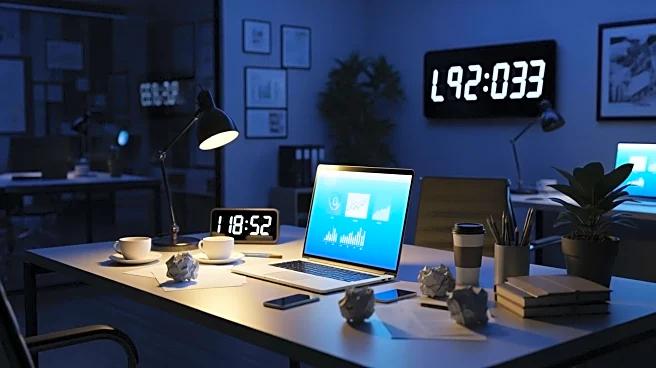What's Happening?
Silicon Valley startups are increasingly adopting a rigorous work culture known as '996,' where employees work from 9 a.m. to 9 p.m., six days a week. This approach is gaining traction as companies strive
to lead in the competitive field of artificial intelligence. Magnus Müller, co-founder and CEO of Browser Use, exemplifies this trend by living in a 'hacker house' with his team, allowing for continuous collaboration. The intense work schedule is seen as essential for startups aiming to capture the AI market within a narrow window of opportunity. Companies like Sonatic and Cognition are promoting this culture, offering perks such as free housing and food delivery credits to attract talent willing to commit to long hours.
Why It's Important?
The adoption of the 996 work culture by AI startups highlights the intense competition in the tech industry, particularly in the field of artificial intelligence. This approach is believed to increase the chances of success by fostering a focused and dedicated workforce. However, it also raises concerns about employee burnout and the sustainability of such demanding schedules. The glorification of long work hours may limit the talent pool, as experienced workers might be less inclined to endure such conditions. The trend reflects a broader shift in startup culture, where the pressure to innovate quickly and capture market share is driving companies to push the boundaries of traditional work-life balance.
What's Next?
As the AI race continues, startups may face challenges in maintaining employee well-being and preventing burnout. The long-term viability of the 996 culture will likely be scrutinized, with potential adjustments to work schedules to accommodate a healthier work-life balance. Companies may need to explore alternative strategies to attract and retain talent, balancing the need for rapid innovation with employee satisfaction. The industry could see a shift towards more flexible work arrangements as startups mature and recognize the value of experienced workers who can deliver results without excessive hours.
Beyond the Headlines
The emphasis on extreme work cultures like 996 raises ethical questions about labor practices in the tech industry. It challenges the notion of work-life balance and may lead to a reevaluation of what constitutes productive work. The trend could influence broader cultural attitudes towards work, potentially normalizing excessive hours as a standard for success. As startups navigate these dynamics, they may need to consider the long-term implications for employee health and the sustainability of their business models.









